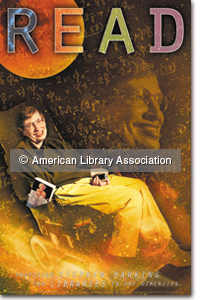
A few weeks back Lane Wilkinson put together a nice thoughtful piece on the Little Free Libraries. While he and I don’t see eye to eye on everything he always makes me think and I have great respect for his point of view. This time he got me thinking about fiction, and the role of recreational reading in libraries.
The following is not really a response to Lane; it doesn’t really need a response. I agree with most of what he says. Also, I’m not hitting every point he makes about stories and shared literary experience (still thinking on that). His noting that my work has “(literally) nothing to say about the aesthetic and cultural value of literature or fiction in libraries” is true. Other than broad strokes that I don’t separate out what we learn from fiction or while we are having fun from non-fiction and when we are doing serious study – I haven’t been explicit. Let me be explicit and ask for your thoughts and reactions. I’ll start with the mission of librarians:
“The mission of librarians is to improve society through facilitating knowledge creation in their communities”
Take a look at the mission again: improving society through facilitating knowledge creation. What ever happened to promoting a love of reading and/or books? Does this adopting this mission mean abandoning reading and literature, fiction and prose? No. The reason reading isn’t in this larger mission is that not all libraries are centrally focused on reading. Where school libraries and public libraries see one of their core goals the promotion and expansion of reading skills (and therefore should include these in their missions); corporate and academic libraries assume the folks they serve already have these skills. What’s more, while reading is a crucial skill to creating knowledge, it is not the exclusive route to “enlightenment.” Some learn through reading, some through video, others through doing (and the vast majority through combining these). We should expect our libraries to support all of these modalities of learning.
When folks ask me about libraries, reading, and my proposed mission they are normally asking “can’t I just use the library to read a good novel or borrow a DVD without worrying about saving the world? Isn’t there value in just reading for recreation?” My answer is yes and that fiction is as important to learning and building knowledge as non-fiction. Stories are how we dream and how we test our ethical bounds. A good novel can often reveal fundamental truth in ways no academic tome of philosophy ever can. What’s more, the ideas and inspirations for great action often come when we least expect it.
Much of library literature focuses on concepts of information and empowerment often ignoring or silently assuming that libraries can still support recreation and reading development. To be sure my work is focused on libraries as places of social engagement and learning. The question isn’t “should libraries support recreational reading.” The answer to that question is dependent on the community — like supporting the arts or parks. The real question revolves around folks who want to turn recreational reading into something social, or geared towards some larger goal.
So I read and love a book. That may be enough for me. But what if a beautiful piece of fiction inspires me to write my own novel, or invent some new device, or form a group of others who love the book and seek to act. It is not the role of the library to predetermine the outcomes of reading (or inventing, or movie making) – that edges too close to telling people what to read and why. Rather it is the place of the library to be a platform for the community member to turn their love and passion into something for the good of the community and/or themselves.
The more we do of something the better we get. So we need to support reading of all kinds where appropriate (in the library, in school, on the playground, on vacation, in the laboratory, in video games). When you read the words “knowledge” and “learning” throughout my work, don’t think I am limiting that to just to the ideas found in textbooks and research articles. Poetry, novels, a good science fiction story all carry equal weight to me in knowledge creation. However, I believe that we should also expect our libraries of all kinds to be ready to support the outcomes of that reading.

Hi Dave, thanks for a thoughtful reply to my post. As to whether fiction always plays into some relevant sort of knowledge creation, that’s a legitimate viewpoint, though it’s a bit too utilitarian of a position for me. Still, even though we don’t see eye-to-eye on theory, I think we agree on values: libraries can and should support all modalities of information seeking.
I agree with you. Knowledge and learning are created through fiction every time a person reads a book written about someone whose life is different than their own.